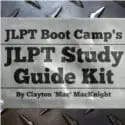This is a special podcast specifically about the reading section (読解) of the JLPT N3. If you have already taken this test or are not planning to take it, you might want to skip this podcast this week. Stay tuned though for podcasts on N2 and N1 that will be coming in the next two weeks. If you are studying for the N5, you might want to check out my podcast on the JLPT N5 reading section or if you are taking the N4, you might want to check out my podcast on the JLPT N4 reading section.
The JLPT N3 Reading Section consists of 16 questions, 4 short passage questions (150 ~200 characters), 6 medium passage questions (~350 characters), 4 long passage questions (~550 questions) and 2 information retrieval questions (~600 characters). For this level, as well as for the N4 and N5 levels, most of these passages are original, meaning they have been specifically written for the test. The long passage might be a piece that has been adapted for the test though.
The topics will still be about daily life, but will be more like commentaries or critiques. You may also find business letters or other types of formal writing on this section of the test. For the information retrieval it will most likely be an advertisement or brochure detailing different options that you must select from.
Something to start looking out for at this level is reading speed. A lot of people taking the test that are more use to speaking and listening to Japanese might find there reading speed is too slow to get through this section on time. The best way to check for this is to take a N3 mock test before the exam, and keep to the times for the official test so you can get an idea of how good your time management is. I detail how to go through a practice test and some reading strategies in my “5 Biggest Mistakes People Make on the JLPT”, so if you haven’t picked that up (for absolutely free) I encourage you to do so.
So, how do you prepare for this level? Well, you can pick up some teenager books at your local recycle shop. These will have furigana to help you look up words you don’t know. They will also generally contain useful vocabulary that you can use on daily basis.
I would also highly recommend picking up some books on reading comprehension specifically if you are not taking a class in Japanese (i.e. at a Japanese university). College students studying here in Japan, generally have to do a lot of reading for class, and will score higher on this section of the test. However, if you aren’t use to that level of reading, it might be a good idea to pick up a book that focuses on it.
There are two good books available for N3. Nihongo So-matome N3 Reading Comprehension is a good book for all around reading comprehension not just the JLPT, so might be useful if you live in Japan and want a more rounded experience. The other option is Quick Mastery N3 Reading Comprehension, which has a lot of example questions that are similar to the test along with time goals. This would be a good option if you just want to get a feel for the test questions and get some reading comprehension practice as well.
Action Steps
Have you taken the N3? If so, what kind of topics came up on the test? What did you find difficult about the test?
Let me know in the comments below!
P.S. I’m now in iTunes. If you like the podcast, please be sure to visit iTunes and leave me a review. If you have comments or suggestions for the podcast, by all means let me know in the comments below or contact me and let me know what I can do to improve the show. Thanks!
Music by Kevin MacLeod, photo by LAC/BAC
Podcast: Play in new window | Download (Duration: 17:33 — 16.1MB)
Subscribe: RSS












Thanks for the useful podcast…
Am taking JLPT N3 next month in London. Am not really feeling ready for it, King’s College cancelled the relvevant progamme this year, so I’ve just been using thr idea of taking the test as a spu to keep me studying. Judging by the comments on the podcast I have been studying the right sort of grammar and the ight level of Kanji, but I doubt I have the depth of knowledge and vocab to pass this time. I am probably at least a yearr of pat-time study- that’s all I can do- away from being fully ready, but with so little info out there, there is still the chane I may be provrd wrong.Anyway it is good prep for the next sitting!
I’ll let you know how thr exam felt afterwards, as it will probably be useful for people unsure whether to enter..
J ARCHER
I don’t think you can ever feel completely ready for the test. The n3 is especially tricky because nobody seems to really know what it’s like. There is not much to go by. But I can say that most of the books out there are fairly accurate.
Good luck on N3 and thanks for commenting.
Hi Mac,
Thanks for all your help! I am taking the test in Kiryu, Gunma.
My question: it says the grammar and reading section is 70 minutes. However, how is that possible, when my guidebook says I should answer the short passages in 3 minutes, the medium passages in 7 minutes, and the long passages in 10 minutes? Based on the number of test items, that would take me 94 minutes!
There is either a mistake or I need to answer the grammar section in 10 minutes, and the short passages in 1 minute, etc.
What guide book do you have?
By the way, I went over time management in this post: https://www.jlptbootcamp.com/2011/06/jlpt-time-time-management-for-the-test/
In short, you should spend about 22 minutes on the grammar section and about 44 minutes on the reading, with 4 minutes to check your work. Keep in mind that that is for the ‘average’ student. So you might want to adjust slightly for your weaknesses.
Thanks for commenting and good luck on the test Steve!
I actually saw your link right after I posted!
I have the green speed master books. They are very good, but the amount of time they advice is longer than what you really need to answer the question in.
One more question: if you know that you just cannot answer all the reading questions with any accuracy, is it better to do what you can thoroughly and just randomly circle the last few questions at the end? Or should I try to do every question but a lot quicker than what I am capable of?
Cheers, again.
There are a few strategies you can use for the reading section:
1) you can go through and skim the reading passages and find the ones that are on topics you are familiar with. Answer those first and then answer the more difficult passages.
I’m not a big fan of this because it cuts your time a little by having to scan each one.
2) you can scan and answer the more difficult ones first.
Some swear by this method because you generally have more focus when you start and can use that focus first on the more difficult readings. Then later when you have less focus you can answer the easier ones.
I haven’t personally test this one out that much, but it looks good ‘in theory’.
3) I personally use reading triage. I hit the passages I know I will do well in and can answer fast (short passage and information retrieval) then go through the more difficult readings. If I read the questions to a passage and have a bit of trouble understanding what they are asking or can’t easily understand the passage. I give it my best answer without too much thought and then mark it with a question mark IN the test booklet NOT the mark sheet. Later, if I have time I go back and spend the remaining time trying to resolve that difficult question.
That’s the 3 strategies that I’m familiar with. Go with the one you are comfortable with. If you are a little weak with vocab you might want to scan and do the ones that have vocab you are familiar with first.
Good luck! -Mac
Thanks!
I might go with no.3 as well. The information retrieval is probably the easiest thing in the whole test for me.
Do you think the points are weighted towards the longer passages, rather than the grammar points since 39 questions for that section does not go into 60 points total?
I guess the examiners don’t reveal how many points each question is worth.
I think the reading is the most straightforward section. The vocabulary and stories are relatively, perhaps deceptively straightforward. If you are nervous do the last question first: it has certainly been the most straightforward I have seen.
The 2 problems are 1)it really needs you to be a faster reader than I am especially given the need to scan and interpret the questions. I think these are is the areas to focus on in practicing: get someone Japanese to give you tricky questions on your passages if possibe
. The actual reading is a doddle, the vocab easier and at times even some key kanji are presented with furigana here! Not easy, but the challenge is than anywhere else except some listening sections.
2 of the passages are relatively long but have one question each. I hardly got to them so I can’t say how easy they ae: it was, essentialy a guess there.
The long passages often support you in that you understanding grows and grows as you scan back and forth. This at least is much easier than the intermediate omprehension textbooks.
When, I took the N3, I felt the same way. There aren’t really too many surprising with the reading. You just have to read the questions carefully, because there is almost always a trick hidden in there somewhere. I’ve gradually increased my reading speed by simply doing more enjoyable reading, which can be hard to find to say the least. There seem to be a lot of ‘reading comprehension’ books, but a lot of them are about boring every day stuff, which is useful, but not very motivating. I’ve turned to reading Disney novelizations and sometimes manga (although the vocab in manga is at times, a bit specialized? shall we say)
Even though this other reading isn’t intensively preparing you for the exam, it is helping to increase your reading speed so you can get through the section a lot easier. I would say, about mm 60% of the time I can read Japanese almost as fast as English (as long as it is grammar/vocab I’m familiar with). I owe a lot of that to just doing a bunch of reading.
Do you do any reading outside of ‘test prep’ stuff?
I also agree the last reading question (information retrieval) is always a cinch, even at the N2 level. I agree it’s an important thing to test, but it always seems like a gimme.
Another useful way to test yourself for this section is to practice doing summaries of articles/things you read (even if the thing you read is in English), because a lot of the questions on the reading at N2+ (or even N3?) are essentially just asking for a summary in different words from the passage.
Thanks for commenting!
Hey Mac,
I have been reading your newsletters. Reading your newsletter give me the ‘feel good factor’ to prepare for the exam. I have given my JLPT L2 and N2 many times, but things havent worked out for me. May be my approach was not correct. This time I have decided to take N3 first then go to N2. Hope this works for me and the content on your stuff also seems to be quiet helpful.
I appreciate the help that you are providing the other students.
Thanks,
Viji Sridhar
Thanks Viji for the kind words.
I did exactly what you did. N2 is a monster of a test, so I went back and passed N3 and now I’m going for the N2, which I just failed (75/180). I’ve been doing a lot of research into what is the most effective way to prepare for this test, especially the N2 and N1 levels. These two tests seem to be massive hurdles for most people taking the test. All I can recommend for now is doing a lot of hard reading, because that has to be the most difficult part of the test.
Good luck Viji! Let me know about your progress!
True Mac. Reading is gonna be a great hurdle for me. The strategy is like to work on strong areas to become stronger and weak areas to strong. I have started to work on my Japanese reading skills. I somehow managed to get the SoMatome series books that you suggested. Now the only problem is that I havent made any perfect plans for GOI and I dont have any proper book for this. Do you think learning Kanji compounds will suffice. Do let me know your views.
I study my vocabulary almost exclusively through Anki and now memrise.com. I really like memrise though because they force you to type in the word and so I learn where the long vowels are and things like that. Anki is too easy to just hit the space bar and move on. Have you given memrise a try?
Hi Mac,
In your post, you recommend to read teenager manga with furigan to prepare the reading section of the N3. Would you mind giving some examples as I am not currently in Japan?
Thanks for the hard work!
Seba
There are a ton of them (they’re actually books, not manga). I recommend the Disney series:
This one is for the new movie Brave, but they have a lot of different ones.
They are probably your best bet if you are out of the country. If you were in Japan, you could leaf through a few and see what you like, but the Disney series are all of movies you probably know, so you can’t really go wrong. The books follow the movie almost exactly, so you can watch the movie than read the book and have a general idea of what is going on without having to look up too much vocabulary.
The problem with manga is the language is often times too slangy to be of good use for the JLPT. There are a few notable exceptions, but they are hard to choose from if you are out of the country.